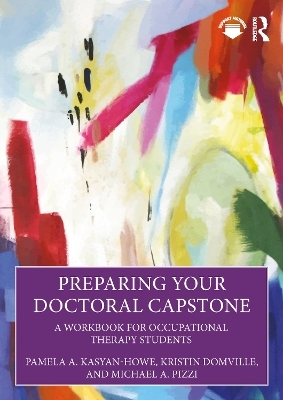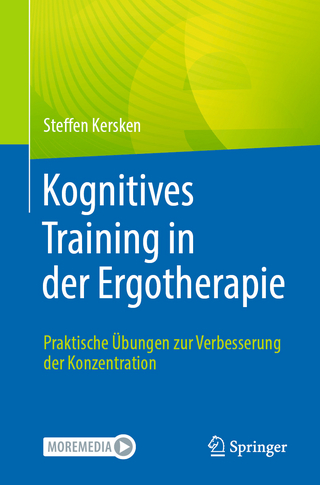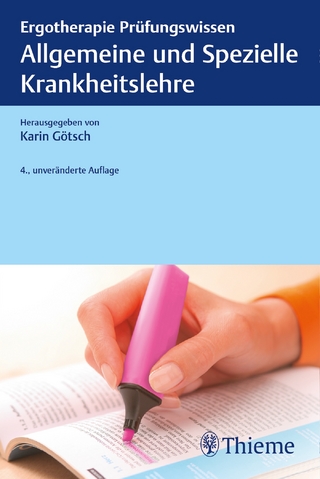
Preparing Your Doctoral Capstone
SLACK Incorporated (Verlag)
978-1-63822-102-9 (ISBN)
- Titel nicht im Sortiment
- Artikel merken
The workbook acknowledges the variability in capstone requirements and supports students by providing strategies to address common components. Each chapter offers tips and advice on topics such as identifying a need, finding a mentor and experiential site, conducting a literature review, developing project objectives, developing experiential objectives, and dissemination of the outcomes. Guiding students to develop a meaningful and productive capstone project and experience, the book includes worksheets and samples of completed student projects and experiences at each stage of the process.
This is the ideal guide for any Doctoral Occupational Therapy student aiming for undertake a successful capstone project, as well as the perfect complement for Doctoral Capstone Coordinators (DCC) and the didactic classroom teaching and learning.
Pamela A. Kasyan-Howe, a DCC with over 20 years in higher education, has developed curriculum for associate to doctoral programs. She has held roles as program director, academic fieldwork coordinator, and doctoral coordinator. Pamela has served as an AOTA doctoral mentor, Chair of FLOTEC, and FOTA SIS Chair for Fieldwork and Capstone Education. She has published and presented at state, national and international venues on fieldwork, doctoral capstone, ethics, and leadership. Kristin Domville is a doctoral capstone coordinator at the University of St. Augustine for Health Sciences, Miami campus. Her extensive experience in clinical practice and academic leadership underscores her commitment to advancing the field of occupational therapy and mentoring the next generation of OT practitioners. Michael A. Pizzi developed one of NY's first OTD programs and is a former DCC. He received the Award for Excellence in the advancement of Occupational Therapy and became one of the youngest Fellows of the American Occupational Therapy Foundation, given to those who demonstrate scholarship, leadership, and service. Dr. Pizzi was guest editor for AJOT Special Issues on HIV/AIDS, Childhood Obesity, and Health, Well-Being, and QOL, and created the Pizzi Health and Wellness Assessment.
Introduction. Introduction to your Doctoral Work and This Workbook. 1.Why the Occupational Therapy Doctorate (OTD) and Introduction to Capstone. 2.Needs Assessment. 3.Finding and Developing a Problem Worth Pursuing and Relevant to the Profession of Occupational Therapy. 4. What’s the capstone project purpose? Alignment of the problem to the project type. 5. Finding a problem and writing a problem statement. 6.Finding a Mentor for a Capstone Research Project. 7.Finding A Mentored Practice setting. 8.From Thoughts to Words: Starting Your Capstone Write-Up. 9.Laying the Foundation. 10.Literature Review. 11.Blueprints to Brilliance: Crafting Your Capstone Plan Writing objectives for your Capstone Project. 12.Defending the Planned Project and the Experience. 13.Planning and Tracking the Experience. 14.Unveiling your Outcomes: The Capstone Project Outcomes. 15.Sustainability of your capstone project. 16.Dissemination. Appendix A.Writing Guidance Per
| Erscheint lt. Verlag | 18.3.2025 |
|---|---|
| Zusatzinfo | 65 Tables, color; 6 Line drawings, color; 5 Halftones, color; 11 Illustrations, color |
| Sprache | englisch |
| Maße | 210 x 297 mm |
| Themenwelt | Medizin / Pharmazie ► Physiotherapie / Ergotherapie ► Ergotherapie |
| ISBN-10 | 1-63822-102-2 / 1638221022 |
| ISBN-13 | 978-1-63822-102-9 / 9781638221029 |
| Zustand | Neuware |
| Informationen gemäß Produktsicherheitsverordnung (GPSR) | |
| Haben Sie eine Frage zum Produkt? |
aus dem Bereich


